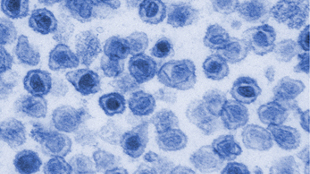 Wikimedia Commons, Center for Disease Control and PreventionThe editors of PLOS Pathogens wish to atone for not warning all corresponding authors that they were retracting the 2006 study that first reported a link between a lab-made virus called XMRV and prostate cancer, according to a PLOS blog post by the editor-in-chief Kasturi Haldar last week (September 28).
Wikimedia Commons, Center for Disease Control and PreventionThe editors of PLOS Pathogens wish to atone for not warning all corresponding authors that they were retracting the 2006 study that first reported a link between a lab-made virus called XMRV and prostate cancer, according to a PLOS blog post by the editor-in-chief Kasturi Haldar last week (September 28).
“We have apologized for not contacting the second corresponding author,” Haldar wrote in the post. “Our expectation was that the first would discharge responsibilities to all remaining authors. We have since corresponded with all authors.”
Though the journal editors contacted the first corresponding author of the seminal 2006 XMRV paper, Joseph DeRisi of the University of California, San Francisco, he was unresponsive to their email messages, and they did not contact the second author, Robert Silverman of the Cleveland Clinic in Ohio. Silverman told ScienceInsider that he was “completely blindsided” by the retraction and said that he had been preparing an erratum he felt was sufficient to address the incorrect link between XMRV and prostate cancer.
“The discovery of XMRV, a new virus, still stands,” ...




















